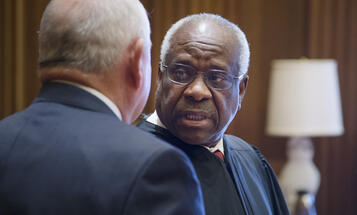
Momentum Builds to Overturn Citizens United
We’re entering high campaign season in what’s shaping up to be the most expensive midterm elections in American history. Outside groups like Super PACs are on pace to spend 17 times what similar organizations shelled out in 2006. And, a small group of millionaires is giving more than ever to candidates and parties. That means that people in swing states and competitive districts are about to be drowning in 30-second attack ads. Perhaps this year some will switch to Netflix until November 5th.
Yet yesterday, a minority of U.S. Senators voted down a constitutional amendment that would clarify that the People have the power to curb the influence of big money on our democracy. The amendment received majority support, but needed a two-thirds vote (and a similar vote in the House) to be put to the states for ratification.
The good news is that the debate on amending the Constitution helps amplify another way to fix the damage the Supreme Court has done to our democracy with cases such as Citizens United and its horrifying 2014 sequel McCutcheon v. FEC. We must also push the Court to reverse course on money in politics, like the justices have done before on New Deal economic protections, racial segregation, LGBT rights, and more.
The fight for an amendment is not over—rather it’s just begun. A trans-partisan majority of Americans supports it by a two-to-one margin; and activists delivered more than 3 million petition signatures on the day of the vote. Just about every generation has amended our Constitution, most recently in 1992. We can do it again.
But, any drive to amend the Constitution is, of course, a long, uphill fight. A second, complementary path to the same goal greatly increases the chances of success.
The Supreme Court caused this problem; it can clean up its own mess. And, the common thread behind the Court’s misguided rulings is actually quite simple. Since 1976’s Buckley v. Valeo, the Court has recognized only one reason for limiting money in politics: fighting corruption or its appearance. The justices have explicitly rejected other reasons, such as leveling the playing field between wealthy donors and the rest of us.
But clean governance is just one of the many core American values at stake, and a key purpose of limiting the role of big money in politics is to prevent wealthy interests from translating economic might directly into political power.
To rescue our democracy from descending into a shouting match between billionaires we need the Court to recognize giving us all an equal voice as a legitimate reason to curb big money, among others. The principle of political equality, after all, is firmly embedded in our Constitution through the Fourteenth Amendment; and ensuring the shouting of a few can’t overwhelm the voices of the many is an important First Amendment value as well.
A group of experienced litigators, advocates, and organizers is already working to transform the Court’s approach to money in politics through the time-tested techniques that previous generations of reformers have employed to push past backwards interpretations of the Constitution. These prior shifts didn’t happen overnight—or by accident. They occurred due to the confluence of evolving public opinion, new legal theories put forth by academics and advocates, changes in Court personnel, and savvy litigation strategies that seized upon new opportunities.
It’s time for a similar shift, and we’ll need a large public outcry to succeed. Contrary to civic textbooks, the Supreme Court does not do its work in a vacuum. The justices are people—and highly political ones at that—and they are acutely sensitive to public opinion and the stature of the Court.
This means that the grassroots momentum around an amendment is a key element of any effort to push the Court to change course. And, it means that there will be critical opportunities for the public to engage when the president nominates and the Senate confirms the next generation of justices.
These are difficult times for our democracy—but yesterday’s vote is cause for hope, not despair. With resolutions demanding action in 16 states and hundreds of municipalities, the drive for an amendment will not fade into the night. And, this same grassroots energy will lay the groundwork for future justices to reconsider the Court’s flawed approach to money in politics.
One way or the other, we will come together to forge a democracy in which the strength of a citizen’s voice doesn’t depend upon the size of her wallet. We must. No less than the fate of our Republic depends upon it.


